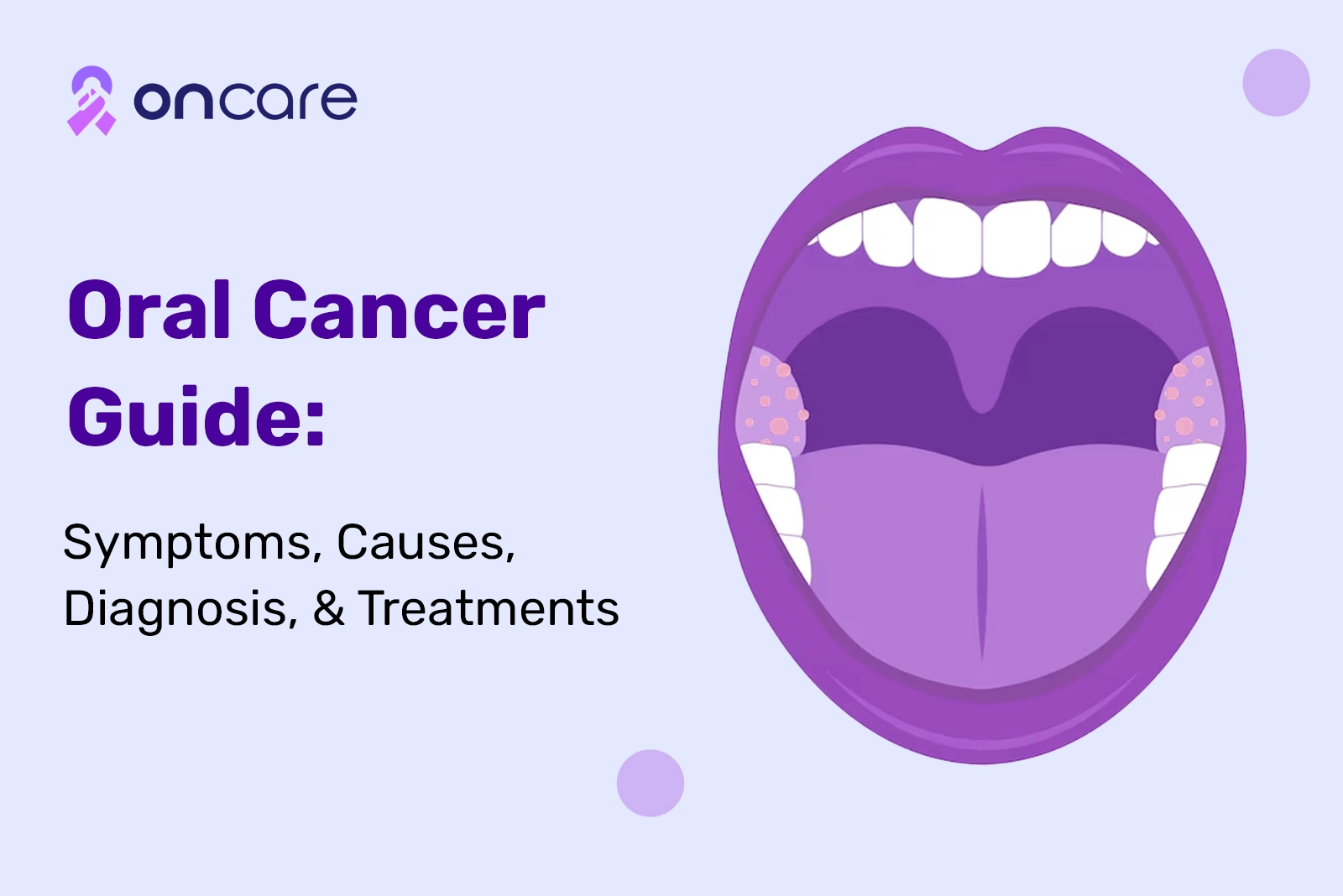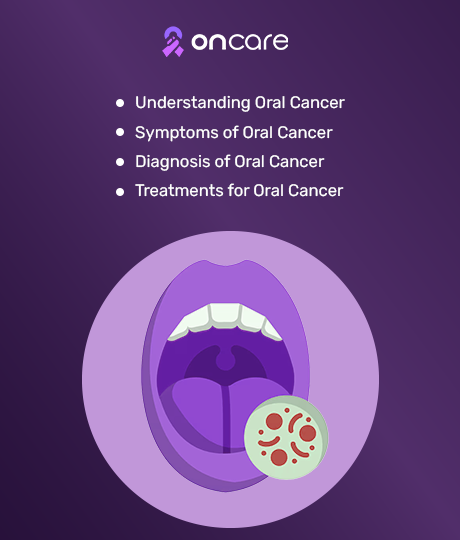Oral Cancer Guide: Symptoms, Causes, Diagnosis, and Treatments

Oral cancer is a serious health condition that can affect various parts of the mouth, including the lips, tongue, and gums. Often linked to factors like tobacco use, excessive alcohol consumption, and poor oral hygiene, it can have life-altering consequences if not detected early. Awareness of oral cancer symptoms and regular screenings are crucial for timely diagnosis and improved outcomes. Early intervention not only increases the chances of successful treatment but also helps enhance the quality of life for those affected. Adopting a healthy lifestyle and seeking prompt medical attention for unusual symptoms are key steps in reducing the risk and ensuring better oral health. At Oncare, we focus on blending advanced medical expertise with compassionate care, empowering patients to navigate their recovery with confidence and hope.
Also Read : Understanding Mouth Cancer: Causes, Symptoms, and Prevention
Understanding Oral Cancer
Oral cancer is a type of cancer that develops in the tissues of the mouth or throat, commonly affecting areas such as the lips, tongue, cheeks, gums, or the roof and floor of the mouth. Although it can occur in anyone, the risk is significantly influenced by factors such as lifestyle choices, genetic predisposition, and environmental exposure. Awareness of oral cancer symptoms and early detection are critical for improving treatment outcomes and overall prognosis.
Educating yourself about the causes, warning signs, and available treatments is vital for maintaining good oral health. Increased awareness, combined with regular screenings, can lead to early detection, improving the chances of successful treatment and recovery. Timely and accurate oral cancer diagnosis through advanced tools and medical expertise plays a crucial role in initiating appropriate treatments. By taking proactive measures, individuals can significantly reduce the impact of this potentially life-altering condition and improve their quality of life.

Symptoms of Oral Cancer
Recognizing the oral cancer symptoms early can make a significant difference in diagnosis and treatment outcomes. While early signs may be subtle, understanding both common early signs of oral cancer and more advanced indications is crucial for seeking timely medical attention.
Common Early Symptoms
Early detection of oral cancer can significantly improve treatment outcomes. Recognizing the signs and symptoms early on can help in diagnosing the condition before it progresses to later stages.
- Persistent Mouth Sores: Sores or ulcers in the mouth that do not heal within a few weeks may indicate abnormal tissue changes, potentially signaling early oral cancer.
- White or Red Patches: Discolored patches on the gums, tongue, or mouth lining, known as leukoplakia or erythroplakia, can be precancerous and require immediate evaluation.
- Swelling or Thickening: Unusual swelling or hardening of any area inside the mouth could suggest the early development of abnormal tissue growth.
- Unexplained Bleeding: Frequent bleeding in the mouth without apparent injury or cause can be a sign of damaged or fragile tissues.
- Difficulty in Oral Movements: Problems chewing, swallowing, or moving the tongue and jaw may indicate underlying issues with tissues or muscles in the mouth.
Advanced Symptoms
When oral cancer progresses to later stages, symptoms become more pronounced and often affect multiple systems in the body. Early detection of these advanced symptoms can help slow or stop cancer from spreading further.
- Persistent Pain or Numbness: Chronic pain or a loss of sensation in the mouth or face could suggest nerve involvement from advanced cancer.
- Lumps in the Neck or Mouth: Firm, immovable lumps in the neck or oral cavity may indicate the spread of cancerous cells to surrounding tissues.
- Speech Changes: Difficulty speaking clearly, slurred speech, or changes in voice tone could result from the impact of cancer on nearby structures.
- Loose Teeth or Denture Problems: Teeth becoming loose or dentures no longer fitting properly can signal changes in the underlying jawbone caused by advanced cancer.
- Extreme Fatigue or Weight Loss: Unexplained fatigue and rapid weight loss often occur as the body fights the effects of cancer in its advanced stages.
- Restricted Mouth Opening: Difficulty opening the mouth completely (trismus) could indicate tumour growth affecting jaw movement or nearby tissues.
Also Read : What are the Symptoms of Mouth Cancer
Causes and Risk Factors
Understanding the causes of oral cancer along with risk factors can help individuals make informed decisions to reduce their risk and take preventive measures. While some causes are avoidable, others may depend on genetic or environmental influences.
Causes
Below are some key causes that lead to oral cancer:
- Prolonged use of tobacco products, including smoking and chewing tobacco.
- Excessive alcohol consumption, particularly when combined with tobacco use.
- Persistent irritation in the mouth caused by sharp teeth or ill-fitting dentures.
- Infection with high-risk strains of the Human Papillomavirus (HPV).
- Prolonged exposure to harmful ultraviolet (UV) rays affecting the lips.
Risk Factors
The following cases have a higher susceptibility to contract oral cancer:
- Higher incidence in individuals over 40 years.
- Men are at a higher risk than women.
- Poor diet lacking essential nutrients, particularly fruits and vegetables.
- Genetic predisposition to certain types of cancers.
- Weakened immune system due to medical conditions or treatments.
Diagnosis of Oral Cancer
Accurate and timely oral cancer diagnosis is essential for effective treatment and better outcomes. Identifying the symptoms early and using advanced diagnostic tools can significantly improve the chances of managing the disease. At Oncare, our oncologists use advanced diagnostic techniques to detect oral cancer at the earliest stages, providing the best opportunities for successful treatment.
- Physical Examination: An oncologist examines the mouth, throat, and neck for visible abnormalities, such as sores, lumps, or discolouration.
- Biopsy: A small tissue sample is collected from the suspicious area and analyzed under a microscope to confirm the presence of cancer cells.
- Imaging Tests: Advanced imaging techniques like X-rays, CT scans, MRI, and PET scans help determine the extent of cancer spread and identify affected areas.
- Oral Cytology: Cells are scraped from the suspicious area and examined for abnormalities, often used for early detection.
- HPV Testing: Testing for HPV infection may be done if the cancer is suspected to be linked to the human papillomavirus.
Also Read : Stages of Oral Cancer and Effective Treatment Options
Treatments for Oral Cancer
Effective management involves choosing the best oral cancer treatments based on the stage and severity of the disease. At Oncare, we offer a range of advanced and patient-focused treatments to ensure the best care for every individual.
Surgery
Surgery is often the first line of treatment for oral cancer, involving the removal of the tumour and, if necessary, affected lymph nodes to prevent cancer from spreading. At Oncare, we have highly skilled oncologists specializing in oral cancer who utilize the latest techniques to minimize damage to healthy tissues. Additionally, reconstructive surgery may be performed to restore the functionality and appearance of the mouth after tumour removal, enhancing the patient's quality of life.
Radiation Therapy
Radiation therapy uses high-energy beams to target and destroy cancer cells in specific areas. This is often recommended for localized tumours or as a follow-up treatment after surgery to eliminate any remaining cancerous cells. Our radiation therapy team employs advanced methods such as intensity-modulated radiation therapy (IMRT), which precisely targets the tumour while minimizing damage to surrounding healthy tissues.
Chemotherapy
Chemotherapy uses powerful drugs to kill cancer cells or shrink tumours before surgery or radiation. At Oncare, chemotherapy is often combined with radiation therapy to enhance effectiveness, particularly for advanced oral cancer. Our oncologists work closely with patients to personalize chemotherapy plans that minimize side effects and optimize the effectiveness of treatment.
Targeted Therapy
Targeted therapy is a precision treatment that focuses on blocking specific proteins or genes that help cancer cells grow and spread. Unlike traditional chemotherapy, targeted therapy spares most healthy cells, resulting in fewer side effects. We specialize in the use of targeted therapies for patients with specific genetic mutations or advanced oral cancer.
Immunotherapy
Immunotherapy works by enhancing the body's natural immune system to fight cancer cells. It is used for advanced or recurrent cases where traditional treatments are less effective. At Oncare, we offer cutting-edge immunotherapy options to provide patients with new hope for long-term survival. Our oncology team monitors each patient's response closely, ensuring that the treatment is adjusted as needed to maximize its effectiveness.
Supportive Care and Rehabilitation
Living with oral cancer can be physically and emotionally challenging. At Oncare, we provide comprehensive supportive care to address these needs. Our patients have access to nutritional counselling to help manage side effects and optimize health, speech therapy to restore communication abilities, and psychological support for both patients and their families.
Follow-Up Care and Monitoring
Post-treatment follow-ups are essential to ensure the cancer has not returned and to monitor for any long-term side effects of treatment. Regular check-ups and imaging tests help in early detection of recurrence and provide ongoing support for recovery. At Oncare, patients can benefit from personalized follow-up plans and access to a dedicated team of oncologists committed to their long-term health and well-being, ensuring comprehensive care at every step of their cancer journey.
Conclusion
Oral cancer is a challenging condition, but early detection and timely treatment can significantly improve outcomes. Addressing risk factors, maintaining regular health check-ups, and staying proactive with oral cancer diagnosis and screenings are essential for prevention and effective management. By focusing on awareness and early medical intervention, individuals can take control of their health and reduce the risk of complications. At Oncare, we are dedicated to providing advanced diagnostics, personalized treatment plans, and holistic care to ensure patients receive the best possible support throughout their journey to recovery and improved well-being.
Frequently Asked Questions (FAQs)
The diagnosis of oral cancer involves a thorough examination of the mouth, throat, and neck by an oncologist, followed by diagnostic tests like biopsies, imaging scans (CT, MRI, or PET), and sometimes oral cytology to confirm the presence and extent of cancer.
Common symptoms of oral cancer include persistent sores in the mouth, white or red patches, swelling, unexplained bleeding, and difficulty chewing, swallowing, or speaking. Advanced symptoms may include lumps in the neck, chronic pain, and changes in voice.
Stage 4 oral cancer symptoms may include severe pain, large tumors, significant difficulty in swallowing or speaking, noticeable facial asymmetry, lumps in the neck due to lymph node involvement, and drastic weight loss or fatigue.
Oral cancer is often caused by lifestyle factors like tobacco use (smoking or chewing), excessive alcohol consumption, prolonged exposure to ultraviolet rays (affecting the lips), and human papillomavirus (HPV) infection. Poor oral hygiene and genetic predisposition can also contribute.
The stage of oral cancer at diagnosis varies but depends on how early the symptoms are detected and medical attention is sought. Early-stage cancers (Stage 1 or 2) are localized, while advanced stages (Stage 3 or 4) indicate greater spread to surrounding tissues or lymph nodes.
Cancer is caused by changes or mutations in the DNA of cells, leading to uncontrolled cell growth. These mutations can result from genetic factors, environmental exposure (e.g., tobacco, radiation), infections (e.g., HPV), or a combination of these influences.
Mouth cancer is diagnosed by specialists such as dentists, oral surgeons, or oncologists. A dentist may notice early signs during a routine check-up, but confirmation typically requires testing by an oncologist or oral surgeon.
Mouth infections are typically caused by bacterial, viral, or fungal pathogens. Poor oral hygiene, weakened immunity, dental issues, or certain medical conditions can increase the risk of infections like gum disease, oral thrush, or herpes simplex virus outbreaks.